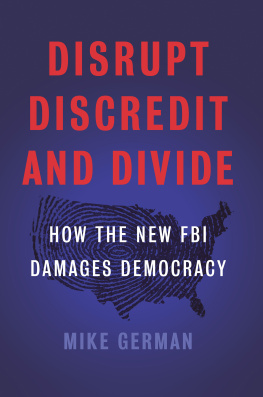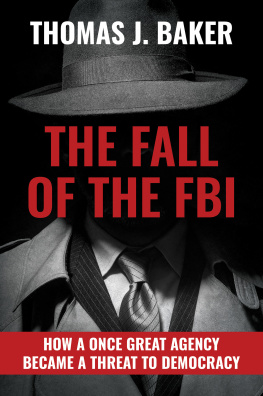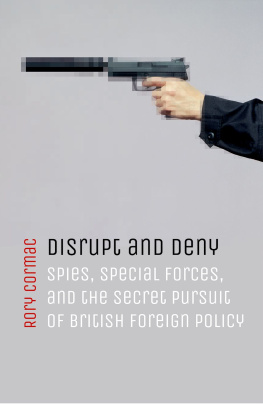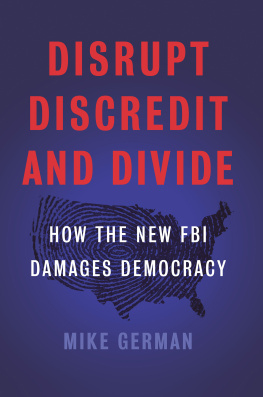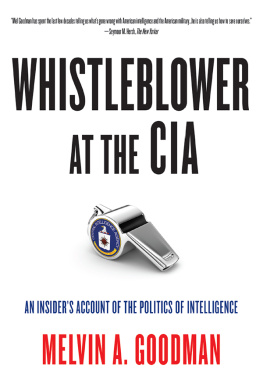
DISRUPT, DISCREDIT, AND DIVIDE
ALSO BY MIKE GERMAN
Thinking Like a Terrorist: Insights of a Former FBI Undercover Agent
DISRUPT, DISCREDIT, AND DIVIDE
HOW THE NEW FBI DAMAGES DEMOCRACY
Mike German

CONTENTS
INTRODUCTION: A LAWLESS LAW ENFORCER
I n 1992, when a fellow agent at the Federal Bureau of Investigation asked me to go undercover to investigate neo-Nazi skinheads in Los Angeles, I would never have imagined that twenty-four years later the FBI and white supremacists would both play influential roles in the 2016 presidential election. But by the middle of 2004, when I resigned from the FBI, I could see it coming.
A vengeful, jingoistic, with us or against us rhetoric animated the war on terror, scapegoating Muslims and immigrants, vilifying political opponents as enemy sympathizers, and dividing American communities against one another by fomenting mutual suspicion and bigotry. Meanwhile, the law enforcement, defense, and intelligence agencies that failed to protect us from the September 11, 2001, terror attacks won broad new powers and a thicker cloak of secrecy to shield themselves from accountability. You didnt need to have spent time with Nazis to worry that this might not end well.
The FBI contributed to this divisive national security discourse. Its leaders, fighting to ensure the bureaus survival amid a post-9/11 restructuring of homeland security assets, publicly denied having any forewarning of the al Qaeda attacks. They blamed legal restraints designed to protect Americans constitutional rights for their failure, suppressing reports from FBI whistleblowers whose pre-9/11 efforts to stop the attacks were stymied not by the law but by bureaucratic ineptitude at FBI headquarters.
Justice Department and bureau leadership used these false pretenses to wring new domestic spying authorities from Congress. They embraced a new mandate to transform the FBI from a law enforcement organization into a full-fledged domestic intelligence agency, with little discussion of what exactly that meant in a constitutional democracy. Predictably, expanding the FBIs powers without reforming its management problems only ensured a new era of abuse would unfold, and made additional intelligence failures inevitable.
For many Americans, the profound changes taking place at the FBI went unnoticed until July 5, 2016, when then FBI director James Comey finally dispensed with the illusion that the bureau was an impartial and apolitical law enforcement agency. The FBI had spent the previous year investigating whether Democratic presidential candidate Hillary Clinton mishandled classified information by using a private email server in her Chappaqua, New York, home while serving as U.S. secretary of state. Leaks from the investigation dogged her throughout the 2016 presidential campaign. When Comey announced the FBI would not recommend charges at his July 5 press conference, he nevertheless accused Clinton of being extremely careless with classified information, defying Justice Department protocols that prohibited disclosing derogatory information from an investigation not resulting in an indictment.
The beneficiary of Comeys contravention of these long-standing Justice Department policies was Donald Trump, the Republican candidate for president who had run an openly Islamophobic, racist, mi-sogynistic, and xenophobic campaign. Trump won an energetic following among a new brand of white nationalists calling themselves the alt-right. Long-forgotten former Klansmen became regular commenters on mainstream election news coverage, along with Twitter trolls, unhinged conspiracy theorists, and well-dressed neo-fascist propagandists.
Comeys aggressiveness during the Clinton investigation contrasted with his agencys lethargic response to Russian government attacks on the 2016 election. FBI agents determined in September 2015 that Russian hackers compromised Democratic National Committee (DNC) computers, but they did little beyond calling the DNC help desk. The ultimate success of the Russian effort to help elect a compromised U.S. president to office may be regarded as the most significant intelligence failure in history, made worse only by the FBI directors direct contribution to that result.
In a sign of the hyperpartisan times, once Trump took office and Comey finally acknowledged the FBI was investigating his campaigns contacts with Russian operatives, many Democrats who had called for Comeys head for sandbagging Clinton became his staunchest defenders. Likewise, many Republicans who had championed the FBIs transformation into a domestic intelligence agency now attacked it as part of a mutinous deep state, seemingly shocked that the expanded surveillance powers they handed the bureau after 9/11 could be turned against them. Trump fired Comey in May 2017, later admitting on national television that it was because of the FBIs investigation into his campaigns collusion with Russians.
This increasingly hostile political tumult wasnt just happening on Capitol Hill. Throughout the 2016 campaign and the first two years of Trumps presidency, far-right extremists held public rallies from coast to coast, brawling with antifascist counterprotesters in the streets as law enforcement stood and watched. Hate crimes in the United States jumped 20 percent in 2016, then another 12 percent in 2017.anti-Trump protesters, Black Lives Matter activists, and Standing Rock water protectors were met with militarized riot police, tear gas, rubber bullets, water cannon, and mass arrests.
This book examines how we got here and how the FBI affected, and was affected by, these social and political disruptions. Since its creation in 1908 by President Theodore Roosevelt, a onetime New York City police commissioner, and his no-nonsense attorney general Charles Bonaparte, the bureau has had an outsized influence on American life. Roosevelt and Bonaparte were Progressive Era reformers who envisioned the bureau as a bulwark to protect the public from predations by the wealthy and powerful. They used the Justice Departments law enforcement powers to fight government corruption, bust corporate trusts, prosecute peonage, ensure consumer protection, and preserve public lands. As Roosevelt explained in 1909, his goal for the Justice Departments investigative service was to secure the conviction of the wealthiest and most formidable criminals, particularly those otherwise protected by wide political and social influence.
Todays FBI far exceeds anything Roosevelt and Bonaparte could have imagined when they hired three dozen detectives to assist Justice Department investigations. Few federal crimes were then on the books, such as frauds against the government, antitrust violations, crimes occurring on government reservations, and those crossing state boundaries. Congress gradually expanded the FBIs jurisdiction as it professionalized its workforce and pioneered the use of scientific methods for gathering and cataloging evidence. The FBI soon became the preeminent law enforcement agency in the country, and arguably the world.
FBI agents are now charged with enforcing thousands of federal laws, protecting the nation from terrorists and spies, and gathering foreign intelligence inside the United States. They assist other federal, state, local, and tribal law enforcement agencies and foreign governments with investigations, behavioral assessments, criminal identification and crime lab services, and training in the latest law enforcement techniques. They operate in war zones and cyberspace as routinely as they do in the American heartland. Yet the FBI remains a relatively tiny agency of about 35,000 employees (smaller than the New York City Police Department), with fewer than 13,000 badge-and-gun-carrying agents spread across 56 U.S. field offices and 63 American embassies around the world. Its a big job that attracts an incredibly talented workforce.
Next page
